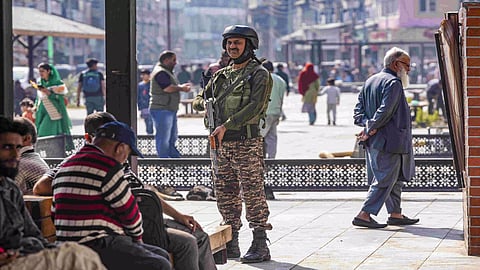

Srinagar/New Delhi | An investigation into the October 20 terrorist attack in Gagangir in Jammu and Kashmir's Gaderbal district has indicated significant gaps in intelligence and undetected infiltration since last one year along the Line of Control (LoC), officials said on Sunday.
The attack, which claimed the lives of seven individuals, including a local doctor and two labourers from Bihar, has raised concerns about the unreported trend of local youths joining militant groups in Kashmir during this period.
The attack on the Z-Morh tunnel construction site involved two terrorists, one identified as a local youth from Kulgam in South Kashmir who joined a terrorist group in 2023, while the other is believed to have come from Pakistan.
Security officials expressed alarm at the rapid radicalisation of local youths, underscoring the need for improved human intelligence (HUMINT) capabilities to identify them.
In light of recent changes in leadership of the Jammu and Kashmir police and the XV Corps of the Indian Army, there is a renewed focus on enhancing HUMINT to prevent local youths from slipping into terrorism.
The terrorists on October 20 entered the construction site and opened fire for about ten minutes before fleeing into nearby jungles. The local assailant was armed with an AK rifle, while his accomplice carried an American M-4 rifle.
Officials indicated that the local terrorist may have been involved in facilitating the infiltration of the other attacker along with his group, who likely crossed the LoC from the Tulail sector in March this year.
There have been intelligence reports of infiltration attempts from various regions, including Tulail, Gurez, Machil and Gulmarg in North Kashmir, since December last year, but the army has been denying them due to lack of corroboration.
Similarly, the terrorists involved in the incident at Bota Pathri in the Gulmarg region on Thursday that left two soldiers and two Army porters dead are believed to have been holed up in the higher reaches of Afrawat since early August, the officials said.
Previously, security agencies have struggled against what they refer to as the "hidden threat" posed by terrorists employing "conservation and consolidation" tactics.
This strategy involves infiltrators remaining dormant within the local population until they receive orders from their handlers in Pakistan.
Officials believe that the recent month-long assembly elections in the Union Territory may have prompted these groups to remain low-profile due to heightened security measures and increased international scrutiny.
The shift in terrorist operations has highlighted the urgent need for enhanced surveillance to thwart foreign mercenaries from executing their plans.
Security forces have noted that the infiltration and recruitment of local youths have increasingly taken place through online platforms.
Terrorists are now relying on encrypted messaging services such as Telegram and Mastodon, which are already banned in certain districts like Rajouri and Poonch, for covert communication and operational coordination.
As authorities remain on high alert, the challenge of gathering actionable ground-level intelligence persists, underscoring the critical need for a comprehensive approach to counter-terrorism in the region, they said.
